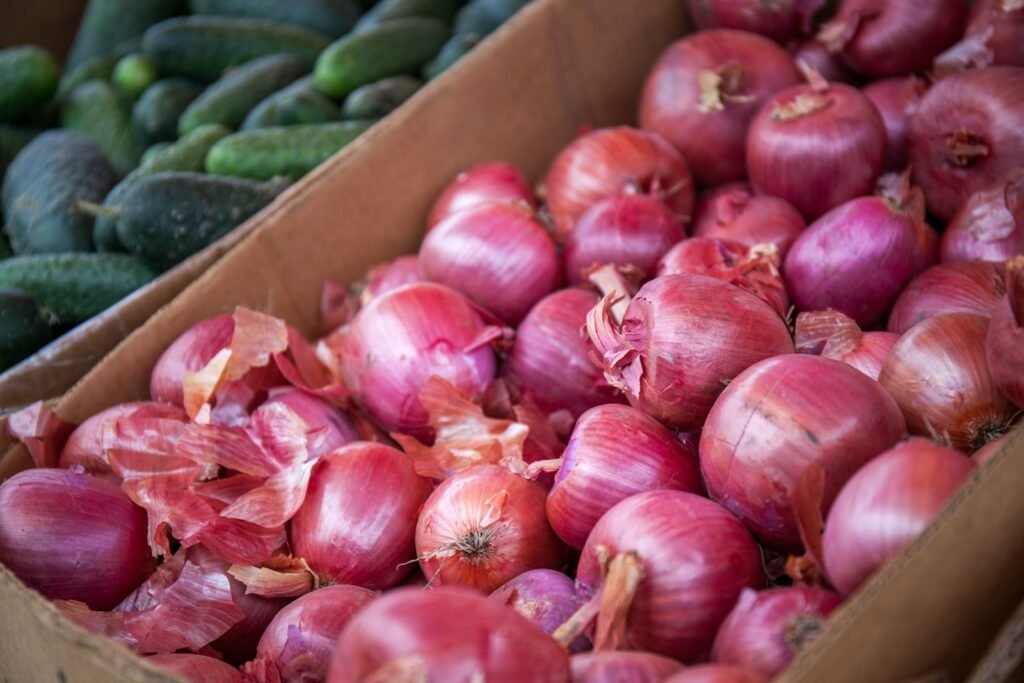Onion Exporter in India
Fresh onion suppliers India
Buy onions in bulk India
India onion wholesale
Best onion exporter India
Organic onions India export
Export quality onions India
Onion supply chain India
Bulk onion supplier India
Red onion exporter India
Wholesale onions India
Fresh onions Dubai supplier
Onion import/export India
India onion trading companies
Yellow onion supplier India
Onion distributors in India
India onion export services
Top onion exporters India
Onion wholesale market India
India onion export companies
MKK Trade is a prominent name in India's onion export industry, known for its expertise in delivering premium-quality onions to global markets. The company specializes in exporting red, white, and pink onions, each valued for their unique flavor profiles and culinary uses. By sourcing onions from India’s leading agricultural regions, including Maharashtra, Gujarat, and Karnataka, MKK Trade ensures a consistent supply of high-grade produce throughout the year. These regions are renowned for their fertile soil and favorable growing conditions, which contribute to the superior quality of Indian onions.
Quality assurance is a cornerstone of MKK Trade’s operations. The company utilizes advanced sorting, grading, and packaging facilities to handle onions with care and precision. This ensures that only the best produce reaches international buyers. With certifications such as ISO and HACCP, MKK Trade adheres to global food safety and quality standards, building trust and confidence among its customers. Additionally, the use of modern cold storage facilities and robust logistics systems guarantees that the onions maintain their freshness and nutritional value during transit, regardless of the destination.
MKK Trade serves a wide range of international markets, including Asia, the Middle East, Europe, and Africa. The company’s ability to understand and adapt to the specific preferences of these regions has contributed to its success. For example, some markets prefer smaller, pungent onions, while others demand larger, milder varieties. MKK Trade meets these needs by customizing its offerings and providing flexible packaging solutions, from bulk shipments for wholesalers to retail-ready packages. This customer-centric approach has solidified its position as a reliable supplier in the global onion trade.
Sustainability and ethical practices are integral to MKK Trade’s business philosophy. The company works closely with farming communities, ensuring fair pricing and promoting sustainable agricultural practices. This not only supports the livelihoods of local farmers but also aligns with the growing global demand for ethically sourced products. By repurposing waste and implementing eco-friendly methods, MKK Trade reinforces its commitment to environmental responsibility, appealing to environmentally conscious buyers.
In its pursuit of growth and innovation, MKK Trade is expanding its product portfolio to include processed onion products such as dehydrated flakes and onion powder. These value-added products cater to the increasing demand for convenience and longer shelf life in international markets. By embracing innovation, maintaining high standards, and focusing on customer satisfaction, MKK Trade continues to elevate India’s reputation as a global leader in onion exports, becoming a trusted partner for buyers worldwide.
Onions are of great importance both in culinary and health contexts, making them a valuable part of global agriculture and diets. As one of the oldest and most widely cultivated vegetables, onions hold a prominent place in cuisines around the world, offering not only distinct flavors but also a range of health benefits. Their significance spans across several dimensions—nutritional, economic, agricultural, and cultural.
Nutritional Importance:
Onions are rich in vitamins, minerals, and antioxidants, making them an important source of nutrition. They are particularly high in vitamin C, which boosts immune health and helps in collagen production for skin, bones, and teeth. The presence of B vitamins, such as folate and vitamin B6, supports energy production and brain function. Onions also contain essential minerals like potassium, which helps regulate blood pressure and fluid balance in the body. Moreover, their rich content of fiber supports digestive health by promoting regular bowel movements and feeding beneficial gut bacteria. They are low in calories and contain compounds that can assist in weight management, making them an excellent addition to any healthy diet.
Onion Exporter in India Onion Exporter in India Onion Exporter in India Onion Exporter in India Onion Exporter in India Onion Exporter in India Onion Exporter in India Onion Exporter in India Onion Exporter in India Onion Exporter in India Onion Exporter in India Onion Exporter in India Onion Exporter in India Onion Exporter in India Onion Exporter in India Onion Exporter in India Onion Exporter in India Onion Exporter in India Onion Exporter in India Onion Exporter in India Onion Exporter in India Onion Exporter in India Onion Exporter in India Onion Exporter in India Onion Exporter in India Onion Exporter in India Onion Exporter in India Onion Exporter in India Onion Exporter in India Onion Exporter in India Onion Exporter in India Onion Exporter in India Onion Exporter in India Onion Exporter in India
Health Benefits:
The health benefits of onions are vast. The antioxidants, including flavonoids like quercetin, help combat oxidative stress in the body, which is associated with chronic diseases such as cancer, heart disease, and diabetes. Onions are also known to have anti-inflammatory properties, which can reduce symptoms of inflammatory conditions like arthritis. Additionally, onions support cardiovascular health by helping to reduce cholesterol levels, lower blood pressure, and improve circulation, thus reducing the risk of heart disease. Their anti-diabetic effects also help regulate blood sugar levels, making them a beneficial food for those managing diabetes. Furthermore, onions contain prebiotics that nourish healthy gut bacteria, contributing to improved digestion and overall gut health.
Culinary Importance:
Culinarily, onions are indispensable in almost every type of cuisine, from Indian and Middle Eastern to European and American. Onions are used as a base ingredient in many dishes, providing essential flavor, texture, and aroma. Whether used raw in salads, pickled, sautéed, roasted, or caramelized, onions bring a distinct balance of sweetness, savory notes, and acidity to food. They are integral in making sauces, soups, curries, stews, stir-fries, and gravy. The versatility of onions allows them to be paired with almost any ingredient, enhancing the taste of meats, vegetables, grains, and legumes. This makes onions a staple in home kitchens, restaurants, and food production industries worldwide.
Economic Importance:
Onions are one of the most widely cultivated and economically significant crops in the world. They have a high market demand, both domestically and internationally, and are a source of livelihood for millions of farmers. India is one of the largest producers and exporters of onions globally, contributing significantly to the economy through exports to countries across Asia, the Middle East, Europe, and Africa. The onion industry also supports various businesses in processing, packaging, logistics, and retail, making it an important economic driver in many countries. The cultivation of onions also contributes to soil health due to crop rotation practices, as onions can break pest cycles and enrich the soil.
Cultural Importance:
Onions also hold cultural significance in many societies. In many parts of the world, onions are more than just a food item; they are part of traditions and remedies. Onions are often used in traditional medicine to treat various ailments such as colds, coughs, and digestive problems. In certain cultures, onions symbolize prosperity and fertility, and they are included in rituals, festivals, and celebrations. They are often placed in homes to ward off illness or attract good fortune, and their versatility in recipes makes them a symbol of sustenance and nourishment.
Environmental Importance:
Onions contribute positively to sustainable agriculture. As a crop, onions require less water than many other vegetables, making them suitable for cultivation in regions with water scarcity. They can be grown in diverse climates and conditions, allowing them to be produced in a variety of environments. Moreover, onions can be included in crop rotation systems, which helps maintain soil fertility and reduces the need for chemical fertilizers. Their ability to grow in different seasons and soil types makes them a reliable and resilient crop, further supporting sustainable farming practices.
Conclusion:
The importance of onions extends far beyond their role in cooking. From their nutritional value, health benefits, and culinary versatility to their economic and cultural significance, onions are an essential part of both global food systems and human well-being. Their global presence in kitchens and markets, along with their various applications in agriculture and medicine, makes onions one of the most vital and cherished vegetables in the world.
Onions are widely celebrated for their health benefits and culinary versatility, but like many common foods, they have also been surrounded by various myths and misconceptions. Here are some common myths about onions:
Onion Exporter in India Onion Exporter in India Onion Exporter in India Onion Exporter in India Onion Exporter in India Onion Exporter in India Onion Exporter in India Onion Exporter in India Onion Exporter in India Onion Exporter in India Onion Exporter in India Onion Exporter in India
1. Onions Can Cure a Cold or Flu
One of the most enduring myths about onions is that they can cure a cold or flu when placed in the bedroom overnight. Some people believe that onions absorb toxins or germs from the air, thereby purifying the environment. While onions do have some antimicrobial properties, they are not a cure for viral infections like the flu or common cold. They can be part of a healthy diet that supports the immune system, but they won’t single-handedly cure illnesses.
2. Onions Cause Bad Breath
While it's true that onions can cause bad breath, this myth implies that onions always lead to unpleasant odors. The strong compounds in onions, especially sulfur compounds, can contribute to bad breath if consumed raw. However, this is temporary, and the odor can be mitigated by drinking water, chewing gum, or eating herbs like parsley. In fact, the health benefits of onions, like boosting digestion and reducing inflammation, outweigh the potential breath issues.
3. Onions Are Bad for Your Eyes
Many people believe that onions are harmful to the eyes because they make you tear up when chopping. This happens because onions release sulfur compounds that react with the moisture in your eyes, forming sulfuric acid and causing irritation. While the tears are annoying, they’re not harmful to your eyes. The sulfur compounds, in fact, are beneficial to the body, offering anti-inflammatory and antioxidant properties.
4. Eating Onions Raw Is Always Better for You
Some people believe that raw onions are always healthier than cooked onions because cooking destroys nutrients. While it’s true that cooking can reduce certain nutrients (like vitamin C), onions still retain many of their health benefits when cooked. In fact, cooking onions may increase the bioavailability of some antioxidants, such as quercetin. Whether raw or cooked, onions are packed with nutrients, and both forms have their own unique benefits.
5. Onions Should Not Be Stored in the Refrigerator
A common myth is that onions should never be stored in the refrigerator because it makes them spoil faster. While whole, unpeeled onions should be kept in a cool, dry place, once they are cut, they should be refrigerated to maintain freshness and prevent bacterial growth. Storing cut onions in the fridge in an airtight container can help prolong their shelf life, while unpeeled onions should remain in a well-ventilated area.
6. Onions Can Help Lower Blood Sugar Levels Immediately
While onions are beneficial for regulating blood sugar over time due to their antioxidant and anti-inflammatory properties, they will not lower blood sugar levels instantly. The compounds in onions, like allyl propyl disulfide, can have a long-term positive effect on managing diabetes, but they are not an immediate remedy for high blood sugar. A balanced diet, exercise, and proper medication are necessary to manage blood sugar effectively.
7. Onions Are Only for Savory Dishes
There’s a myth that onions can only be used in savory dishes. While onions are a staple in many savory recipes, they can also be used in sweeter applications. Caramelized onions, for example, add a sweet and savory depth to many dishes. Additionally, onion jam or onion chutney can provide a sweet and tangy contrast when paired with meats, cheeses, or bread. The natural sugars in onions, when caramelized, bring a unique sweetness to various dishes.
8. Onions Are Not Good for People with Acid Reflux
Many people with acid reflux or GERD believe that onions are a trigger food that should be avoided. While onions can cause irritation for some individuals, especially when consumed raw, they don’t affect everyone in the same way. Cooked onions are typically easier on the stomach than raw onions. If you have acid reflux, it’s important to pay attention to your body's reaction to onions and consume them in moderation, focusing on cooking them thoroughly to reduce irritation.
9. Onions Are Not Nutritious
Some people mistakenly believe that onions are just flavor enhancers and have no significant nutritional value. Onions are actually rich in vitamins (like vitamin C and several B vitamins), minerals (including potassium), and antioxidants (such as quercetin and sulfur compounds). They also contain fiber, which supports digestion, and have anti-inflammatory properties that contribute to overall health.
10. Onions Will Always Make You Cry
While it’s true that onions can make you tear up, not all onions cause the same level of irritation. The intensity of crying varies depending on the type of onion, with sweet onions causing less irritation than sharp, pungent varieties. Additionally, certain methods of chopping onions, such as chilling them beforehand or using a sharp knife, can reduce the release of irritants and lessen the likelihood of tears.
Conclusion:
While onions are often surrounded by myths and misconceptions, many of these ideas are based on outdated or misunderstood information. Onions are not only versatile and flavorful but also offer a wealth of health benefits when consumed as part of a balanced diet. Understanding the truth behind these myths can help people appreciate the full potential of onions in their culinary and health routines
Could you clarify what exactly you're referring to by "need"? Are you asking for more information about onions, their benefits, or something else? Please provide more context so I can assist you better.
Onions are incredibly healthy and offer numerous health benefits when incorporated into a balanced diet. Here's a breakdown of how onions contribute to overall health:
1. Rich in Nutrients
Onions are a great source of essential nutrients, including vitamins C and B6, folate, and potassium. Vitamin C is essential for immune health, collagen production, and skin health, while Vitamin B6 supports brain health, metabolism, and energy production. Potassium helps regulate blood pressure and fluid balance in the body.
2. Packed with Antioxidants
Onions are loaded with antioxidants, such as quercetin, which help protect the body from oxidative stress caused by free radicals. Oxidative stress has been linked to the development of chronic diseases like heart disease, cancer, and diabetes. By reducing oxidative damage, onions contribute to overall health and longevity.
3. Support Heart Health
Onions promote cardiovascular health by helping to lower cholesterol levels, regulate blood pressure, and improve blood circulation. They contain sulfur compounds that reduce the risk of blood clots and improve overall heart function. Studies have shown that regular consumption of onions can help reduce the risk of heart disease.
4. Anti-inflammatory Properties
Onions have anti-inflammatory effects, which can help reduce inflammation in the body. Chronic inflammation is linked to a range of conditions, such as arthritis, heart disease, and even cancer. Onions help reduce symptoms of inflammatory diseases and promote overall health by modulating inflammatory responses.
5. Supports Digestive Health
Onions are rich in fiber and prebiotics, which feed beneficial gut bacteria and promote a healthy gut microbiome. A healthy gut is crucial for digestion, nutrient absorption, and immune function. Regular consumption of onions can improve digestive health and prevent common issues like constipation, bloating, and indigestion.
6. Helps Regulate Blood Sugar
Onions are beneficial for people with diabetes as they help regulate blood sugar levels. Certain compounds found in onions, such as allyl propyl disulfide, have been shown to improve insulin sensitivity and lower blood sugar levels over time. This can help manage diabetes and reduce the risk of complications.
7. Boosts Immune System
Onions contain vitamin C and other compounds that help boost the immune system, making the body more resilient against infections and illnesses. Their antibacterial and antiviral properties help fight off infections and can act as a natural remedy for common colds, sore throats, and coughs.
8. Promotes Healthy Skin
Due to their high vitamin C and sulfur content, onions can help improve skin health. Vitamin C supports collagen production, which is essential for skin elasticity and strength. Additionally, onions have been used in traditional remedies for acne, scars, and skin pigmentation due to their antibacterial and healing properties.
9. Supports Bone Health
Onions contain vitamin K, which is essential for bone health. Vitamin K plays a crucial role in calcium regulation and bone mineralization, helping to maintain strong bones and reduce the risk of fractures. Some studies suggest that onions may help prevent osteoporosis by improving bone density.
10. Detoxifies the Body
Onions help with the body’s detoxification process by flushing out toxins. They contain compounds that promote liver health and support the body’s natural detox mechanisms, helping to remove harmful substances and improve overall health.
Conclusion:
Incorporating onions into your daily diet can have a profound impact on your overall health. From supporting heart health and improving digestion to boosting your immune system and promoting healthy skin, onions offer a wide range of benefits. Whether raw, cooked, or in a variety of processed forms, onions can be a nutritious and beneficial addition to any meal.




